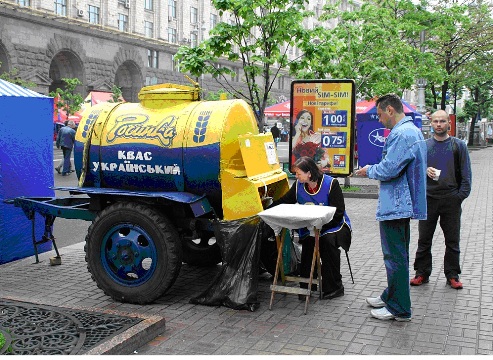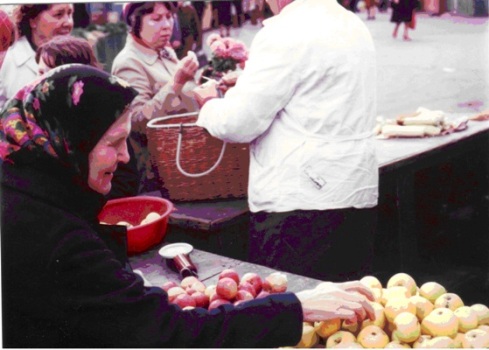A summer in Russia Posted by josefina on Jul 8, 2010 in Culture, History, Russian life, Soviet Union, when in Russia
We spent two years in Russia, when I was Naval Attaché in the U.S. Embassy in Moscow, 1981 to 1983. Here are some of my memories of summer there:
«Белый пух» [white down; fluff; fuzz]: Summers in Russia are short, but intense, and sweet. In Moscow, our first memory of summer is «белый пух» [white down; fluff; fuzz] or the snowstorm of wispy white seedlings from all the poplar trees that General Secretary Khrushchev planted all over the city in the 1960s. It was a good, fast-growing tree, but no one really researched the fact that the female trees put out such a snowstorm of seeds.
«Мороженое» [ice cream] was another sign of summer in Moscow. There were ice cream stalls everywhere, and you could have any flavor you wanted, as long as it was «ванильное» [vanilla] or «клубничное» [strawberry]. Many of the stands were even open in the cold of winter, when you had to eat the ice cream fast, before it froze as hard as stone. Even though there were few flavors, it was a delicious treat.
It was good to visit the Moscow «рынки» [outdoor markets] in summertime, because farmers and gardeners brought their goods to the city in what was always a colorful display. Once as I stood in a queue waiting to buy containers of «клубника» [strawberries], a woman behind me began to tell me how glad she was that soon she would be drawing her pension. People got on trains all over the USSR with big trunks and boxes full of flowers, fruit and vegetables to sell in the Moscow markets.
At Danilovsky Rynok, Moscow, ca. 1982.
«Мурманск» [Murmansk]: We traveled a lot, all over the Soviet Union, and got to enjoy a lot of variety from Latvia and Estonia in the west to Khaborovsk and Nakhodka in the Far East. On the longest day of the year, June 21st, we flew to Murmansk, well north of the Arctic Circle. During the days of the USSR it was a huge naval base, as well as a vital fishing port.
On the longest day in Murmansk there is no nighttime. We celebrated by looking for a good restaurant to enjoy some «свежая рыба» [fresh-caught fish]. Alas, in those days, fishing boats froze their whole catch for shipment to market, so even in this city with hundreds of fishing boats, you couldn’t find a fresh fish in a restaurant. At least, we «иностранцы» [foreigners] couldn’t find any.
We went to a nice restaurant, with a small orchestra playing, and ordered «водка с икрой» [Ice cold vodka with a tiny plate of caviar] and a bit of «масло» [butter] and «сметана» [sour cream]. They brought us large, very impressive menus, but we had lived in the USSR for two years by then, and we were aware that large menus did not mean that most of the dishes offered on the menu were actually available.
We went through the usual exercise of ordering a dish, and then the waitress would say: «Нету…» [the colloquial version of «нет»] and we would move to the next. Finally, we would give up and say, «Хорошо… что у вас?» [lit. Good… what do you have?] Then we’d usually have «котлеты» [chops; cutlets] or «шашлык» [shashlik; shish kebab].
As we were enjoying our vodka, a wedding party started coming in and filled up tables in one side of the restaurant. They immediately started in with toasts of «шампанское» [champagne], and we walked over and offered our «поздравления» [congratulations] to the «жених и невеста» [Bride and groom]. I had an American dime in my pocket, along with the «копейки и рубли», and I offered it to the Bride, saying that in our world it was good luck for the bride to carry it in your shoe. Actually the custom is a penny, rather than a dime, but I inflated the custom because I didn’t have a penny.
We had several nice little conversations with members of the wedding party, particularly the older members. They told us how grateful they were to the Americans for the shipments we sent right to Murmansk during the Lend Lease during the «Вторая мировая война» [World War II].
Harry’s Pie Shop: We visited Leningrad (St. Petersburg) a lot. On our way around Leningrad, along about lunchtime we would stop by Harry’s Pie Shop. I don’t know what the real name was – probably «Пирожковая № 389 (триста восемьдесят девять)» [‘Pie Place Nr. 389’] or such. This shop turned out little «пирожки» [greasy pastry turnovers]. Two kinds – one with cabbage inside, and the other with cabbage and mysterious ground meat. They served them with hot «чай» [tea] in a «стакан» [glass], with chunks of sugar. Or, you could go out in front and there was a guy with a tank on wheels, selling «квас» [kvas] or beer. Kvas is a lightly fermented drink made of old bread. The Russian «пиво» [beer] was very watery and weak, and tasted mostly like flavored water. I’m sure today Russian beer has greatly improved in taste. If you didn’t have your own cup, the guy who was selling this stuff listlessly washed out the community mug he has on hand, and sold you your kvas or beer in that. You have to eat the little «пирожки» while they were hot, because when the grease cooled, they were inedible.

Ukranian Kvas Tank.
Best wishes,
Sam Coulbourn
Rockport, MA

Build vocabulary, practice pronunciation, and more with Transparent Language Online. Available anytime, anywhere, on any device.





Comments:
Peggy:
I really enjoyed reading this; thank you for sharing.
trudy ringer:
I also enjoyed your article, Sam. Did you go to Kижи? That was fabulous.
Sarah:
I’m so grateful for this blog! I’m trying to enhance my knowledge on Russian language. So this has been a perfect marriage between Russian words and culture. I thank you so much for teaching me about Russian life!!
Throbert McGee:
“This shop turned out little «пирожки» [greasy pastry turnovers]. Two kinds – one with cabbage inside, and the other with cabbage and mysterious ground meat.
Heh-heh-heh! The phrase «пирожки с котятами» — “kitten turnovers” — is sometimes used humorously (???) for pastries filled with low-quality “mystery meat”.